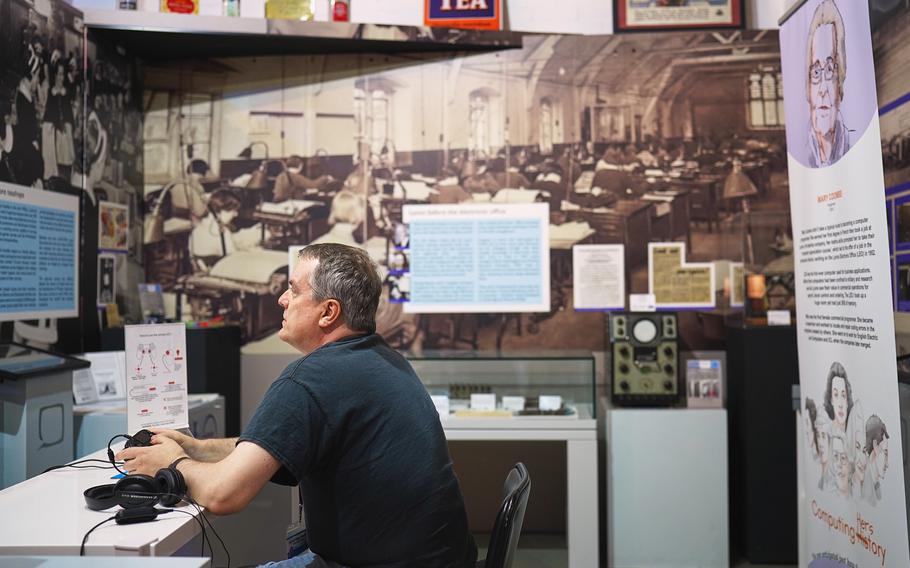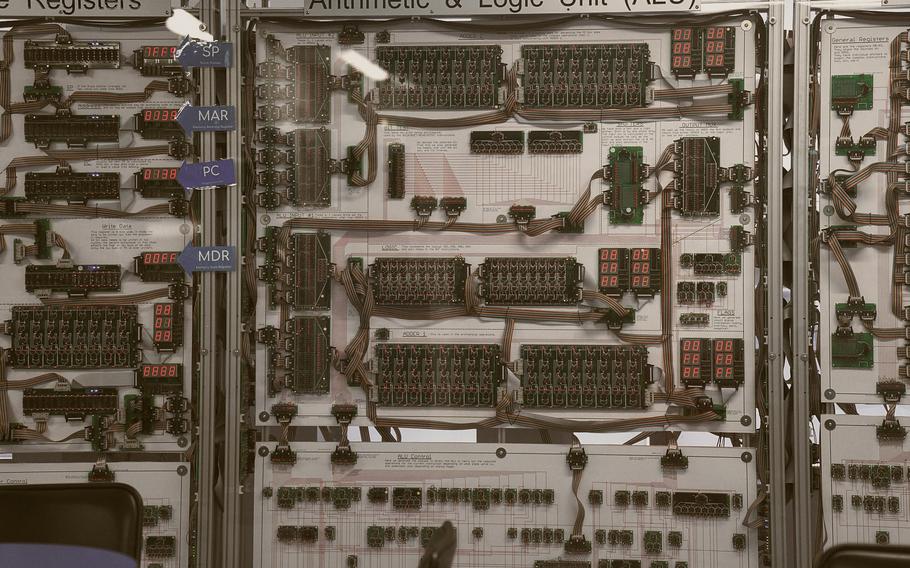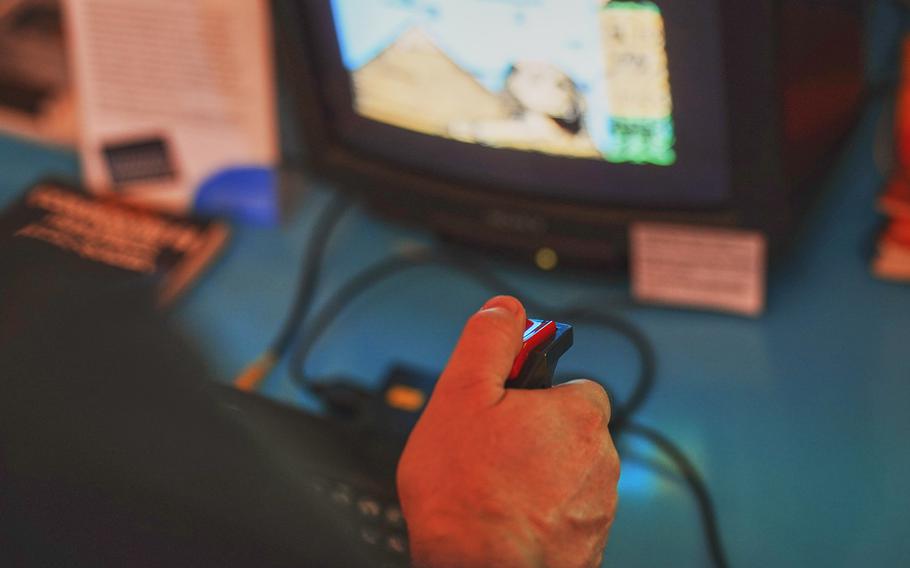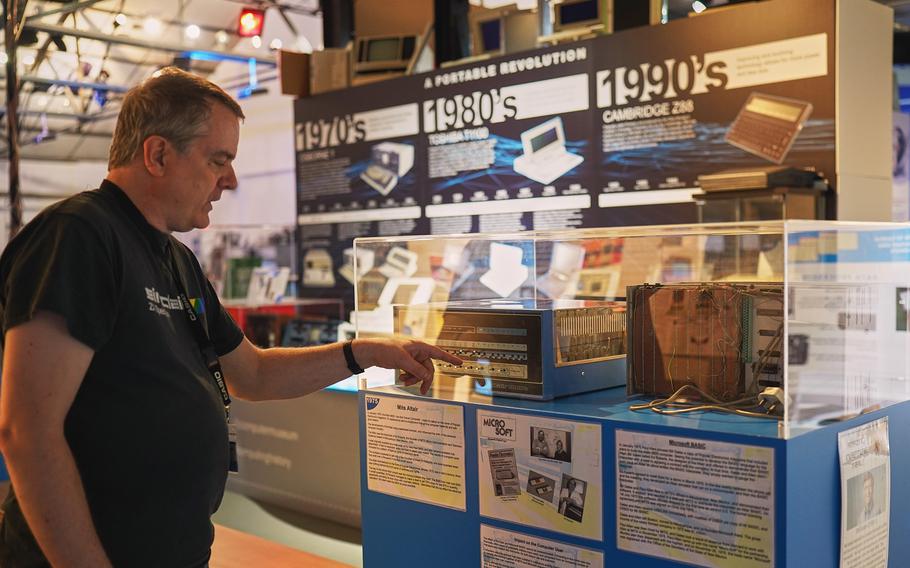
Adrian Paige-Mitchell, a worker at the Center for Computing History in Cambridge, England, shows as part of a tour on Aug. 31, 2024, what an office in the 1990s looked like. The museum seeks to present different periods of computer technology history using innovative means such as virtual reality. (Loretto Morris/Stars and Stripes)
Not many places that preserve the past can boast of a giant video game collection to draw interest, but a museum in the world-renowned English city of Cambridge has that and much more.
The Center for Computing History, a 30-minute drive from RAF Mildenhall, contains more than 40,000 items, according to its website. It offers an assortment of hands-on exhibits, vintage computers and nearly 15,000 video games. And that’s just scratching the surface.
“The fast-paced nature of the computing industry, along with its tendency to discard irrelevant technology as soon as it becomes outdated, means that the heritage around its origins and subsequent developments is at risk of being lost,” the museum website states.
Technology and its history fascinate me; the various presentations at the museum do a lot to facilitate learning for those who are new to it .
The museum is situated in an industrial area, so there is plenty of parking. My visit lasted about two hours, which was enough time for me to take a guided tour and interact with the computers and game systems.
For visitors with military interests, there are early drafts of naval missile detection systems, language decoders and other wartime relics.

The Center for Computing History in Cambridge, England, is home to the MegaProcessor, which is touted as the world's largest microprocessor. The museum's interactive exhibits make learning about the history of technology a hands-on experience. (Loretto Morris/Stars and Stripes)
Another highlight is the MegaProcessor, which is billed as the world’s largest working model of a microprocessor. The contraption is about 33 feet long and 6.5 feet tall and weighs approximately half a ton.
Roughly 10,000 LEDs show how the microprocessor works, helping to teach computing basics.
The guided tour option is included in the admission price, so I gladly decided to avail myself of the added knowledge. My guide, Adrian Paige-Mitchell, covered topics ranging from the earliest calculators to sophisticated mobile phones and home computers.
I saw how a computer dating from 1949 read physical code and translated it into a singular command called the Electronic Delay Storage Automatic Calculator.

A patron at the Center for Computing History on Aug. 31, 2024, plays "Bomb Jack" on a Sinclair ZX Spectrum built in 1982. The museum in Cambridge, England, has a collection of nearly 15,000 video games to go along with its range of vintage and modern equipment. (Loretto Morris/Stars and Stripes)
To wind down this part of the tour, my guide and the calculator played a neck-and-neck game of tic-tac-toe, or noughts and crosses as the British call it.
This led us to the next room, which showed the path computers took to becoming an integral part of daily society. A key driver of that process was J. Lyons & Co., a conglomerate that created a chain of popular teashops in the early 1900s.
The company was seeking ways to innovate production and distribution, a quest that resulted in the creation of the Lyons Electronic Office, commonly referred to as the first office computer.

Adrian Paige-Mitchell of the Center for Computing History in Cambridge, England, talks about the museum display showing the first model of at-home computer. The exhibits there highlight the lineage and progression of the everyday electronic technology we use today. (Loretto Morris/Stars and Stripes)
The museum has an interactive virtual tour filled to the brim with facts and animations that show what these facilities looked like.
If you’re more of a hands-on learner, the ’70s room is a physical set designed to mimic offices of that time. It has a computer with a coding challenge for those who would like to try their hand at programming the way people did back in the day.
Another exhibit shows the sea change in storage, from entire rooms that hold only eight Harry Potter movies, according to Paige-Mitchell, to media that fits in a pocket and has the capacity for over 16 million copies of the whole franchise.
It provides an excellent understanding of how the devices we see and use every day without a second thought came into being.
The museum also contains a section dedicated to the history of video gaming, from arcade booths to home consoles. Everything is in working condition, so visitors can experience the whole gamut of electronic gameplay.
Vintage systems from such old-school names as Atari, Commodore and Sega combine with a vast array of Nintendo products as well as a lineup of PlayStations and XBoxes.
Visitors who want to take a bit of computing history back home with them will find a plethora of quirky items for sale in the gift shop.
It’s not as if anyone needs an excuse to visit Cambridge. The Center for Computing History just gives the city one more standout attraction to consider.
On the QT
Address: Rene Court, Coldham’s Road, Cambridge, England Hours: Wednesday-Sunday, 10 a.m.-5 p.m.; closed Monday and Tuesday Cost: 12 pounds for admission Information: Phone: 01223214446, Online: www.computinghistory.org.uk